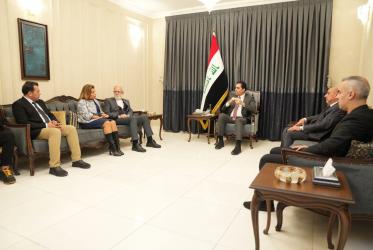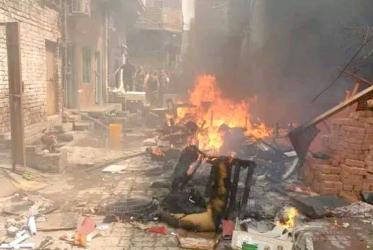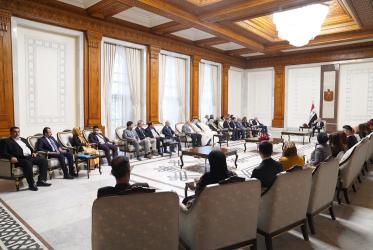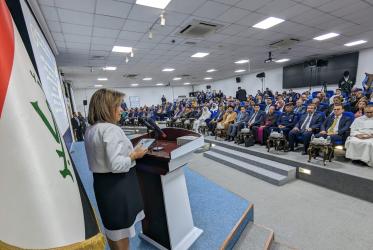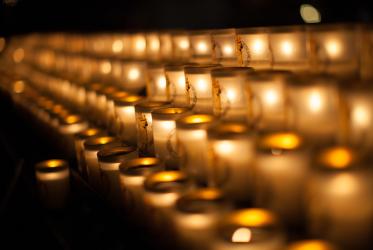As people of faith we are called to see and challenge the abuse and misuse of power. Both as members of the global body of Christ and as citizens of the most powerful country of the worldif power can be measured by material wealth and military mightwe must name the ways our country exercises its power at the expense of others. Increasingly, our nation has displayed its power in isolation and by acting unilaterally. The United States went to war in Iraq on the basis of mistaken evidence and over the objections of some of our closest allies and the United Nations. It has refused to sign international treaties (e.g., those safeguarding the environment and preventing the development of new strategic weapons systems), and abrogated others. It has declared U.S. immunity to the standards and jurisdiction of international law.
We speak, moreover, in a time when the flagrant abuse of power has become evident in the sordid and cruel violations of human rights in U.S. military prisons in Guantanamo Bay and Iraq. As U.S. Christians, we are profoundly shamed by these violations of persons that have been perpetrated in the name of our country and in the pursuit of national security.
In view of such pursuit, it is both ironic and tragic that much of this exercise of power in the name of self-defense arose from the pervasive sense of vulnerability and fear that followed the brutal September 11 attacks on our country. Yet, far from erasing our sense of vulnerability, the United States' resort to military might in Afghanistan and Iraq has only increased it. For we can see today how military superiority does not ensure victory, how an armed presence does not guarantee and preserve peace and stability, and how recurring threats of military intervention erode international respect and friendship. Fear coupled with the arrogant use of power does not bring peace; instead, fear escalates while our reliance on coercion becomes more desperate.
As lay leader and writer Peggy Shriver notes in one of her poems, "We climb the heavens with death-dealing power, yet we live in fear." We become more fearful of the world, and the world becomes more fearful of us. Enmity grows, as does the cycle of violence in which we have become entangled.
Political power and military power are, moreover, just two of many forms of power. Our wealth and culture alternately seduce and invade the rest of the world. Our demand for raw materials, cheap labor and skilled workers has too often resulted in the corruption of governments around the world, the distortion of their economies, the impoverishment and exploitation of people, and the emigration of their best educated and most talented. We imagine that our economic power is in our control, yet are coming to realize with increasing unease that globalization produces victims everywhere as well as beneficiaries. But we lack today the political will and the political institutions to address the human suffering and dislocation that are produced by this process. Our unilateralism stands in the way of effective solutions for global problems.
Until we experienced the disastrous initial response of our government to hurricane Katrina (August 29, 2005), millions of U.S. citizens had not questioned the nature and the limitations of the political, military and economic power we exercise with so much unconscious pride. But this tragic catastrophe, the worst natural disaster in our nation's history, has begun to reveal the limitations of being the lone "superpower." Through new lenses we are beginning to see as a nation what many of us have tried to deny. In the despairing and angry faces of our sisters and brothers who pleaded for help for days, we saw the depth of our racism and indifference to those with the fewest resources. At the same time, we had to contend with our own sense of helplessness and outrage. Slowly and painfully, increasing numbers of us are making the connections between the suffering of those at home and the suffering we inflict elsewhere because of the abuse and misuse of our power. Others have come to this realization through their, (or their relatives') bitter experiences in Iraq or Afghanistan, as is manifest in the growth and witness of "Gold Star Mothers for Peace."
As U.S. Christians, we therefore reach out to our brothers and sisters throughout the world in confession and repentance. We acknowledge that all too often we have used our wealth and prowess only for our own benefit, and that we have used our power as a prerogative without accountability. We have wandered far from the Christian vision of peace and its power. We call ourselves dwellers in a global village, but are afraid to love our neighbors as ourselves (Mark 12:31). We give thanks for the abundance of creation, but ignore the admonition "Do not harm the earth or the sea or the trees ." (Revelation 7:3). The power of God's love frees us to love our enemies, to do good to those who hate us and to bless those who abuse us (Luke 6:27-28), but the demands of such freedom overwhelm us. It is so much easier to despise our personal and national enemies and to vow to defeat them. And so we struggle in this country to be mindful of the ways of Jesus and to make them our own.
As people of faith, we seek to recover our biblical sense of God's power and promise of peace. Just as the peace Christ gave to us is not that which the world gives to us (John 14:27), so too, the power to which we bear witnessthat of God's love for the world, evident in Christ's life and resurrectionis of a different nature. For Christians, the power of God's love is superior to that of all principalities and secular powers (Col. 2:10 and 15). As Christians we are called to labor in a faith expressed in love. (John 15:12). Such labor seeks, among other forms of service, to strengthen the forces for justice and peace in the world. Rooted in the life, suffering, death and resurrection of Jesus, this nonviolent witness seeks a true restoration of God's creation and of right relationships among the peoples of the world. Because the power of God's love is different in nature from the power of fear, domination and violence, we must strive not only for a new understanding of power but also for a deeper and more profound trust in the power of love revealed in Jesus Christ.
As U.S. Christians, we struggle to understand the limitations and possibilities of power. "Power in and of itself is morally neutral It is the energy, the potential to act, to effect and to shape." ("Nurturing Peace, Overcoming Violence," Faith and Order, World Council of Churches, Decade to Overcome Violence). Political and other forms of power, including the power of religious faith, can be forces for good or evil, for creation or destruction. Often projected as something good and worthy of emulation, destructive power is dangerous in its capacity to deceive and to distort.
Throughout much of the world, destructive forms of power are evident in the thoughtless exploitation and spoiling of natural resources in the pursuit of profit, in abusive political or economic might wielded by a few over the lives of the many, and in myriad forms of violence, personal and collective, that destroy the lives of other human beings. We have discovered firsthand that destructive power takes on a life of its own that places even the "powerful" at its mercy.
We have learned, as one of our theologians, William Sloane Coffin, has said, that: "The trouble with violence is that it changes not too much, but too little." The same can be said of all destructive forms of power, whichfar from making us more secure or eliminating enmity toward us, or bringing about a new heaven and new earthhave only increased our sense of insecurity. When we unleash dubious forces in the pursuit of worldly power, we ourselves become its victims. In the pursuit of wealth, military strength and other images of power, we actually become dependent on these images and lose our capacity to imagine and pursue more healthy alternatives. And when our limited images of power fail uswhen despite our wealth, we confront a host of seemingly irresolvable social problems and humanitarian crises and when, despite our military strength, we find ourselves in unwinnable warswe are reminded that our images of power are often, in fact, illusions.
Thus, it is right that the World Council of Churches in its document "Nurturing Peace" speaks of the need to "interrogate power." Power, we have learned, is seductive, in part, because it so often is used in ways that create the illusion of strength and control over our destiny. This illusion becomes the mask for our fears and vulnerability.
We seek, therefore, as U.S. Christians to interrogate our own power, unmask its illusions, confront our fears, and return to God. We must turn away from the false gods of worldly power that simply mask our fears. We must seek new forms and understandings of power that will not entrap, but liberate us. In these efforts we must acknowledge again that all human power is ultimately subservient to the transformative and restorative power of God. As U. S. Christians we feel called in this historical moment to
ÿ refuse to submit to the misuse of authority. We must "speak truth to power" and use our own power to stand in solidarity with the victims of violence as we work for justice.
ÿ unmask the abuse of power in all its forms. We must recognize idolatry and speak out against the false gods of worldly prosperity and might.
ÿ lay claim to the positive power with which all human beings are endowed, especially the power of God's love, and work within that power to change our society and the ways in which it exercises its enormous power throughout the world.
In this quest, we take heart from nonviolent models of power that have been and continue to be exercised in transformative and positive ways. There is a long history of powerful shifts in human affairs that has taken human beings further along the path to justice and peace, and away from violence and strife. We are indebted to those creative minorities in India, South Africa, Eastern Europe, Chile, the Philippines, Israel/Palestine and many other parts of the world for their refusal to resort to violence in response to armed threats, persecution and oppression. We are grateful to the men and women whose radical and deeply spiritual visions of transformation have created powerful movements and systemic change in our own country; their nonviolent struggles for independence, for racial, ethnic and gender justice and wholeness, and for peace and human rights have altered the course of our history.
These nonviolent forms of power witness to the "power in relation" that derives not from might or position, but from cooperative and generous relations with others. To forge such relations, we must be rooted in nonviolence as a way of life and, as Martin Luther King, Jr. revealed, we must be courageous. Grounded in respect, power in relation, moreover, builds trust; it generates renewable social and moral energy. Such power, in the experience of women seeking both justice and security, rejects the notion of fixed amounts of power that produce exultant winners and humiliated losers. Fighting over fixed amounts of power produces stale scenarios and destructive solutions; fixed power proponents become entrapped in worsening spirals of violence of their own making, thereby setting the stage for new and more deadly conflicts to emerge.
"Power in relation," on the other hand, taps the power each of us has to transcend the boundaries of our own lives, overcome our fears and take collective risks. When exercised with those committed to nonviolent transformation, power is not seized by a few, but shared and exercised by many. By being inclusive, such power can lead to the common good. By being restorative, it enables old enemies to address painful histories, make amends, and create a peaceful common future for their children. By being transformative, it allows us to change our own thinking, inspired and supported by the insights and strengths of one another, and to be liberated to think and act in new ways.
As U. S. Christians we seek to foster new understandings and practices of power that will enable us to live in true community with our brothers and sisters everywhere. We believe that religious tradition and faith can make a powerful contribution to this process. The theologian Daniel C. Maguire has spoken of the "renewable moral energy of religion." We seek to draw upon this moral energy as part of a "strategy for struggle" within the United States that will lead us to new understandings and practices of power.
Between 2001 and 2010, both the World Council of Churches' Decade to Overcome Violence and the United Nations' Decade for Nonviolence are challenging people everywhere to seek peace by peaceful means. These two Decades are summoning us to work in partnership with members of other faith traditions as we affirm our deepest values and witness for justice and nonviolence.
For many U.S. Christians, our particular contribution to this global effort will be to come to terms with our own power and transform it into the creative, life-giving source it could be. To sustain us on this journey, we shall rely upon the power of God's grace and abiding love for all of creation. We seek not so much a new beginning as a long process of reflection, renewal and risk to make that witness real. We must do this as Christians and as citizens of our nation. But we cannot do this alone. In a spirit of humility and profound gratitude for the ways in which you, our brothers and sisters, have spoken truth to power and used your own "power in loving relation" to transform your societies, address your histories, and work for God's peace, we ask for your prayers, your forgiveness, your guidance, your hope and your solidarity at this deep moment of crisis for millions of us in the United States Christian community.
Lay and Ordained Members of Roman Catholic, Protestant and Historic Peace Churches at the Invitation of the World Council of Churches, U.S. Conference's Decade to Overcome Violence Committee United States, 2005.
